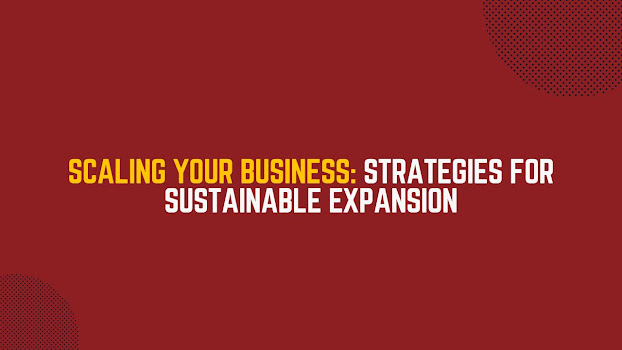Scaling Your Business: Strategies for Sustainable Expansion
In the fast-paced world of entrepreneurship, scaling your business is the golden key to unlocking unprecedented levels of success and sustainability.
But how does one navigate the complex waters of expansion without losing sight of their core values and operational integrity?
This guide will walk you through effective strategies for scaling your business, ensuring a path of sustainable growth.
What is Business Scalability?
Understanding business scalability is crucial for entrepreneurs aiming for long-term growth and success. Scalability refers to a company's capacity to grow and manage increased demand without compromising on performance or quality. A scalable business can expand its revenue significantly while only incurring a minimal increase in operational costs. This concept is foundational for any company looking to expand its market reach, introduce new products, or enter new geographical locations while maintaining efficiency and profitability.
The essence of scalability lies in the business's ability to leverage its existing infrastructure — such as technology, processes, and team — in a way that supports growth without the need for proportional increases in resources. For example, a software company that can sell its product to an increasing number of customers without substantial additional costs (like customer support or product customization) is considered scalable.
Also read: Worst Ways Entrepreneurs Spend Money During their Entrepreneurial Journey
What Are the Key Indicators of Scalability?
Key indicators of scalability are essential metrics and signs that demonstrate a business's readiness and potential to grow efficiently and sustainably. These indicators help entrepreneurs and managers gauge whether their business model, operations, and strategy are set up to handle expansion without incurring unsustainable costs or losing service quality.
Operational Efficiency: This indicator reflects how well a business can increase its output or services without a proportional increase in costs. Efficient operations, often supported by automation and streamlined processes, are crucial for scalability, as they allow the company to accommodate growth without significant increases in operational complexity or expenses.
Market Demand: Scalability is heavily dependent on the demand for a business’s products or services. A growing customer base and evidence of sustained or increasing interest in the market indicate that the business can scale up. This demand ensures that the resources invested in scaling will likely result in increased revenue.
Financial Readiness: A scalable business must have solid financial foundations and access to capital necessary for expansion. This readiness involves having the funds to invest in growth initiatives—such as marketing, new hires, technology, and infrastructure—without endangering the company's financial stability.
Scalable Business Model: The business model itself must support growth. This means having products or services that can be easily replicated or delivered to a larger customer base without needing significant customization or one-on-one interaction.
So, in essence, these key indicators of scalability provide a roadmap for businesses aiming to grow. They represent the blend of internal capabilities and external market conditions that enable a company to expand efficiently, maintaining or improving profitability as it grows.
Strategies for Sustainable Expansion Of Business
1. Invest in Technology
In the digital age, leveraging technology is paramount for businesses aiming to scale. By automating routine processes, companies can drastically reduce the need for manual labor, freeing up valuable human resources for more strategic tasks that require human insight. Moreover, technology plays a crucial role in enhancing the customer experience through personalized services and seamless interactions, fostering loyalty and satisfaction.
Additionally, the use of sophisticated data analytics tools provides businesses with actionable insights, enabling them to make informed decisions, identify market trends, and tailor their offerings to meet customer needs more effectively. This strategic integration of technology not only streamlines operations but also positions businesses for sustainable growth and competitive advantage.
Also read: Effective Ways to Automate and Grow Your Business
2. Strengthen Your Core Offerings
Before embarking on the journey of expansion, it's crucial for businesses to solidify their foundation by ensuring that their core products or services are thoroughly refined and fully prepared to meet market demands. Achieving excellence in your primary offerings guarantees a stable base of operations and customer satisfaction, which is essential for sustaining growth.
Diversification, though tempting as a growth strategy, should be approached with caution and only after the business has secured a strong position within its primary market. This approach minimizes risk and focuses resources on strengthening the business's competitive advantage, ensuring that when diversification does occur, it builds upon a proven, successful base, rather than diluting efforts across untested markets.
3. Expand Your Market Reach
Expanding your business horizon involves exploring opportunities beyond your established market to fuel growth and increase revenue. This strategic move can involve penetrating new geographical regions, where untapped potential customers await, or identifying and catering to different demographic groups whose needs align with your offerings.
Additionally, the digital revolution offers a lucrative avenue for expansion by pivoting to online platforms. This digital shift not only broadens your reach globally but also caters to a tech-savvy consumer base, opening doors to a vast array of market segments. By diversifying your market presence in these ways, you're not just reaching more customers but also mitigating risks by not relying on a single market for revenue. This proactive approach to expansion ensures your business remains resilient and capable of sustained growth in the ever-evolving market landscape.
4. Focus on Customer Retention
While attracting new customers is crucial for business growth, nurturing and retaining existing ones offers a more cost-effective and sustainable approach to enhancing revenue. Existing customers, familiar with your brand, require less investment to maintain than the effort and resources spent on converting new leads. Implementing loyalty programs rewards continued patronage, incentivizing repeat business. Personalized marketing efforts resonate more deeply, creating a tailored experience that fosters loyalty. Additionally, providing exceptional customer service ensures satisfaction, addressing concerns promptly and efficiently, which solidifies trust and encourages long-term relationships. Together, these strategies not only optimize customer lifetime value but also build a strong, loyal customer base that supports steady revenue streams and promotes positive word-of-mouth, further amplifying acquisition efforts.
5. Build a Strong Team
In the journey of scaling a business, your team stands as the cornerstone of success. Recruiting versatile and skilled individuals who align with your company's vision can propel your business forward, bringing innovative ideas and driving growth.
Embracing the global talent pool by considering remote workers not only diversifies your team's skill set but also offers a wider range of perspectives and experiences. This strategic approach ensures your team is equipped to handle challenges and opportunities alike, making your workforce a dynamic force in achieving scalable growth.
Also read: Why Should You Plan Your Business With Business Startup Consultants?
6. Secure Adequate Financing
Scaling a business is an ambitious endeavor that demands significant financial investment. Exploring diverse financing options becomes imperative to fuel this expansion. Venture capital offers a substantial infusion of funds in exchange for equity, ideal for businesses with high-growth potential. Loans provide a traditional route, offering immediate capital with structured repayment terms.
Crowdfunding, on the other hand, leverages the support of a broad audience, validating your business concept while raising funds. Selecting the right financing method requires careful consideration of how it fits with your business’s long-term objectives, ensuring that it not only supports immediate growth needs but also aligns with your overall strategic vision, maintaining financial health and operational autonomy.
7. Optimize Supply Chain Management
Optimizing your supply chain is a strategic move that can lead to considerable cost savings and enhanced operational efficiency, crucial for scaling businesses. By rigorously evaluating your suppliers and logistics partners, you ensure they are capable of managing increased volumes without compromising quality or timelines.
This assessment should focus on their reliability, scalability, and cost-effectiveness. Streamlining these elements of your supply chain not only prepares your business for growth but also creates a more resilient and flexible operation. This proactive approach helps minimize disruptions, reduce overhead costs, and improve the overall customer experience, thereby supporting sustainable business expansion.
8. Innovate Continuously
Innovation is the lifeblood of competitive advantage, distinguishing your business in a crowded marketplace. Continuously seeking novel improvements in products, services, and operational processes not only enhances your offerings but also optimizes internal efficiency. This relentless pursuit of innovation ensures your business remains relevant and responsive to changing market demands. It fosters a culture of creativity and adaptability, driving sustainable growth and securing a leading position in your industry.
9. Emphasize Sustainability
Adopting sustainable practices is a strategic decision that extends beyond environmental stewardship; it positions your business as a responsible and forward-thinking entity. Utilizing eco-friendly materials and renewable energy sources not only reduces your ecological footprint but also often results in significant long-term cost savings.
Ethical labor practices ensure fair treatment and safety for employees, fostering a positive work environment. Collectively, these sustainable actions enhance your brand image, appealing to a growing demographic of environmentally and socially conscious consumers. This commitment to sustainability can differentiate your brand in the marketplace, attract loyal customers, and contribute to a healthier planet.
Also read: Why Startup Consultants Are Best For New Businesses?
10. Monitor and Adapt
Expansion demands ongoing vigilance and adaptability. It's critical to embed a system of continuous performance monitoring, leveraging key metrics to gauge your expansion's success. This data-driven approach enables you to remain agile, making informed decisions swiftly in response to evolving market dynamics, customer preferences, and operational insights. Such responsiveness ensures that your expansion strategies are not static but evolve to meet the changing landscape, maximizing opportunities for growth while minimizing risks. This proactive stance not only sustains momentum but also reinforces your business’s resilience and competitiveness in the long term.
NOTE:
In today's rapidly evolving business landscape, scaling your enterprise is not merely about expansion; it's about sustainable growth that withstands the test of time. At Econstra, we understand the intricate balance between ambition and stability. As experienced business consultants, our article, "Scaling Your Business: Strategies for Sustainable Expansion," delves into the key tactics necessary to navigate this journey successfully. From leveraging technology to streamline operations to fostering a culture of innovation, we provide actionable insights tailored to your unique business needs. By prioritizing scalability alongside profitability, we empower entrepreneurs to build resilient enterprises equipped for long-term success in an ever-changing market. Join us as we explore the pathways to sustainable expansion and unlock the full potential of your business with Econstra's expert guidance.
Conclusion
Scaling your business for sustainable expansion is a nuanced and complex process, requiring a delicate balance between growth and stability. By implementing these strategies, you can pave the way for your business to reach new heights while maintaining its core values and operational integrity. Remember, the path to scaling is a marathon, not a sprint. Patience, perseverance, and strategic planning are your best allies in this journey.

.jpg)


Comments
Post a Comment